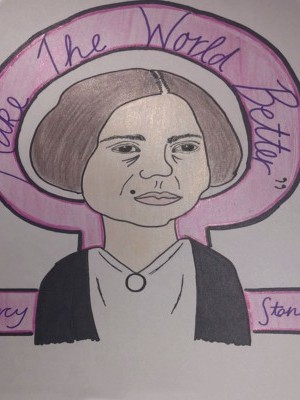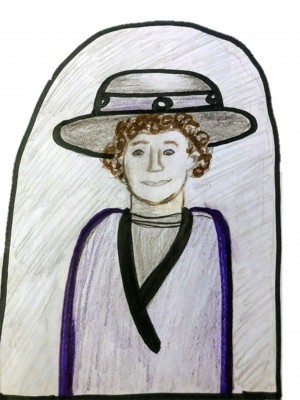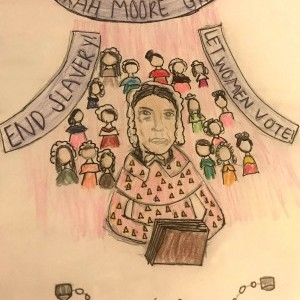Helen Anderson, Elise Durelli, Sarah Davis, Fatima Ortiz Andrade & Julia Cragon
St Cecilia Academy | Nashville, TN | 11th Grade
Historical Figure I admire
Alice Paul
Born in Mount Laurel Township, New Jersey on January 11, 1885, Alice Paul was always taught by her parents and teachers that men and women should be treated equally and given equal rights. She was raised in a Quaker family and attended Quaker school as a young girl. After many years of school, at the age of twenty-two, she settled in England, where she found her true calling as a woman in the 19th century: women's suffrage and the fight for women's rights.
While in England, she joined the British suffrage movement and helped to plan parades or rallies, many times ending with being arrested. After England, she returned to the United States and gained her Ph.D. in sociology and really began her career in women's suffrage. She first began working in the National American Woman Suffrage Association (NAWSA). In NAWSA, she gathered a group of girls on a mission to make suffrage a nationally known topic of discussion. She organized a plan to march down Pennsylvania Avenue and join with President Woodrow Wilson’s inauguration. The parade did not go as planned because male spectators of the parade attacked the suffragists with insults and even physical violence. Although the parade did not turn out how they hoped, it did appear in national headlines the next day, quickly becoming a national topic of discussion.
After another incident with Alice Paul and other suffragists continuously protesting outside the White House and as the police said, “obstructing traffic,” they were arrested and placed in Occoquan Workhouse, a prison in Virginia, for seven months. While in prison, she staged hunger strikes as a way of protesting her imprisonment. Once the news of the conditions in the prison were released by the press, people demanded that the women be released. Prior to her prison sentence, Paul met with President Wilson about the need for an amendment to the Constitution regarding women's rights, which he refused at the time. However, after the public heard about the hardships the women faced, he “reversed his position about the amendment and announced his support for a women's suffrage amendment, calling it a ‘war measure’(Anon).”
Even after the amendment was created, Paul was still not satisfied with women's rights and wanted to do more. She proposed the Lucretia Mott Amendment, now known as the Equal Rights Amendment, which states, “Men and women shall have equal rights throughout the United States and every place subject to its jurisdiction” (“Alice Paul”). Alice Paul died on July 9, 1977, in Moorestown, New Jersey. Her voice and dedication to women’s rights continue to inspire young women and girls. Her contribution to women’s rights has helped to give countless women the equal rights they deserve.
Historical Figure I Admire
Christabel Pankhurst
Christabel Pankhurst was a very influential person in the women's suffrage movement. She was born September 22, 1880 in Manchester, England to parents Emmeline and Richard Pankhurst. Growing up in a house with two radical socialist parents for women's rights, she became a suffragist leader responsible for organizing the tactics of the militant British suffrage movement. She fought for all women's right to vote in England and the equality insured with it. With her mother, Emmeline Pankhurst, they founded the Women' s Social and Political Union in 1903. The WSPU campaigned for social reform through protests such as hunger strikes and property damage. Its militant stance is summed up in its slogan: Deeds, not words.
Although England allowed women to vote in local elections and act on school boards since the 1880s, full political equality was absent and, therefore, a problem with most women in England at the time. In 1905 Christabel interrupted a Liberal Party meeting, a major political party of the United Kingdom, demanding voting rights for women. This outburst got her sent to prison for disrupting the peace along with her other suffragist, Annie Kenney. This caused a major media increase and a rapid growth in the number of women joining the Womens Social and Political Union. Although the WSPU was getting more attention, most of it was unfavorable and alarming. In 1908, members began to have more outbursts in the public and began to get destructive. They aimed largely at the existing power structure and designed for maximum publicity. Their activities consisted of pouring acid on mailboxes, vandalizing artwork, and breaking windows. They argued though, that they were forced to take these more drastic militant actions because of Parliament's obstruction. By the actions taken, Christabel was teaching women to fight for their backbone and not allow themselves to be walked all over. However as World War One began, the WSPU began to fade out of media attention. The WSPU then founded the Woman's Press, which oversaw publishing and propaganda for the organisation, and marketed a range of products from 1908 featuring the WSPU's name or colours.
In 1918, the Representation of the People's Act introduced women's suffrage for those 30 years of age who owned property. This bill was passed by majority in the House of Congress with a total of 385 in support and 55 against. Although this bill did not grant voting rights to all women, it was a major start and the WSPU would be satisfied with the results for the time being. Christabel later died in February 13, 1958 in California from a heart attack.
It is eye opening to see the extreme actions and situations, which the women of the WSPU were willing to take part in, in order to gain women's suffrage. The women in the WSPU had noticed that women, who had chosen peaceful methods, had few results and were often ignored by society. However, the WSPU, who used militant tactics, moved in the correct direction by forcing society to pay attention to women's needs and overall resulting in change for women's rights.
SOURCES +
What the Project Means to Me
The ability to vote is such a privilege. Not many women in different countries have this ability. In America, everyone eligible to vote can vote—no matter ethnicity, race, religion or gender. I often feel that it can be taken for granted, and overlooked because it is “normal” now in our society. Millions of people around the world live in countries where they are not allowed to vote. These people are not allowed to express their opinions if they differ from the government’s. They can be arrested or even killed if they express beliefs. They don't have the right to vote for their leaders or have any say in who is governing their lives. The ability to vote means that we can express our opinion and hopefully plan for a future that not only benefits ourselves but also future generations. The statistics for young voters have gone rapidly down in recent years. I feel the ability to vote is greatly overlooked. We should be proud to live in a country where this is possible. The youth of America has the power to make decisions that can affect the country. If you don’t like the way America is run, and yet you don’t vote in elections or make your opinions heard, then you cannot voice your opinion on how the government should be run.
Deadline Extended
There's still time to join Women Leading the Way.
Become a part of our storytelling archive. Enroll your class today.
Join the Project



